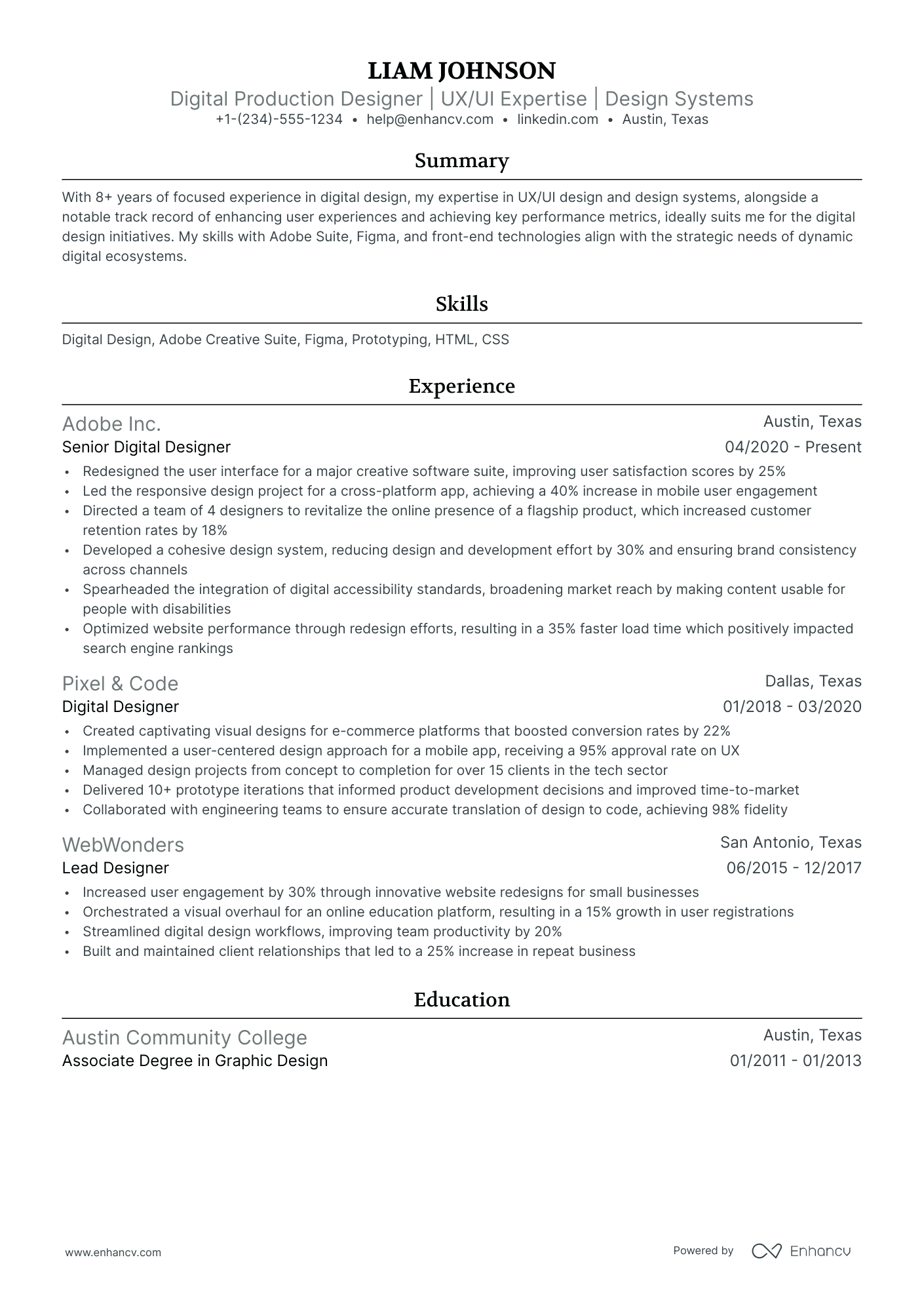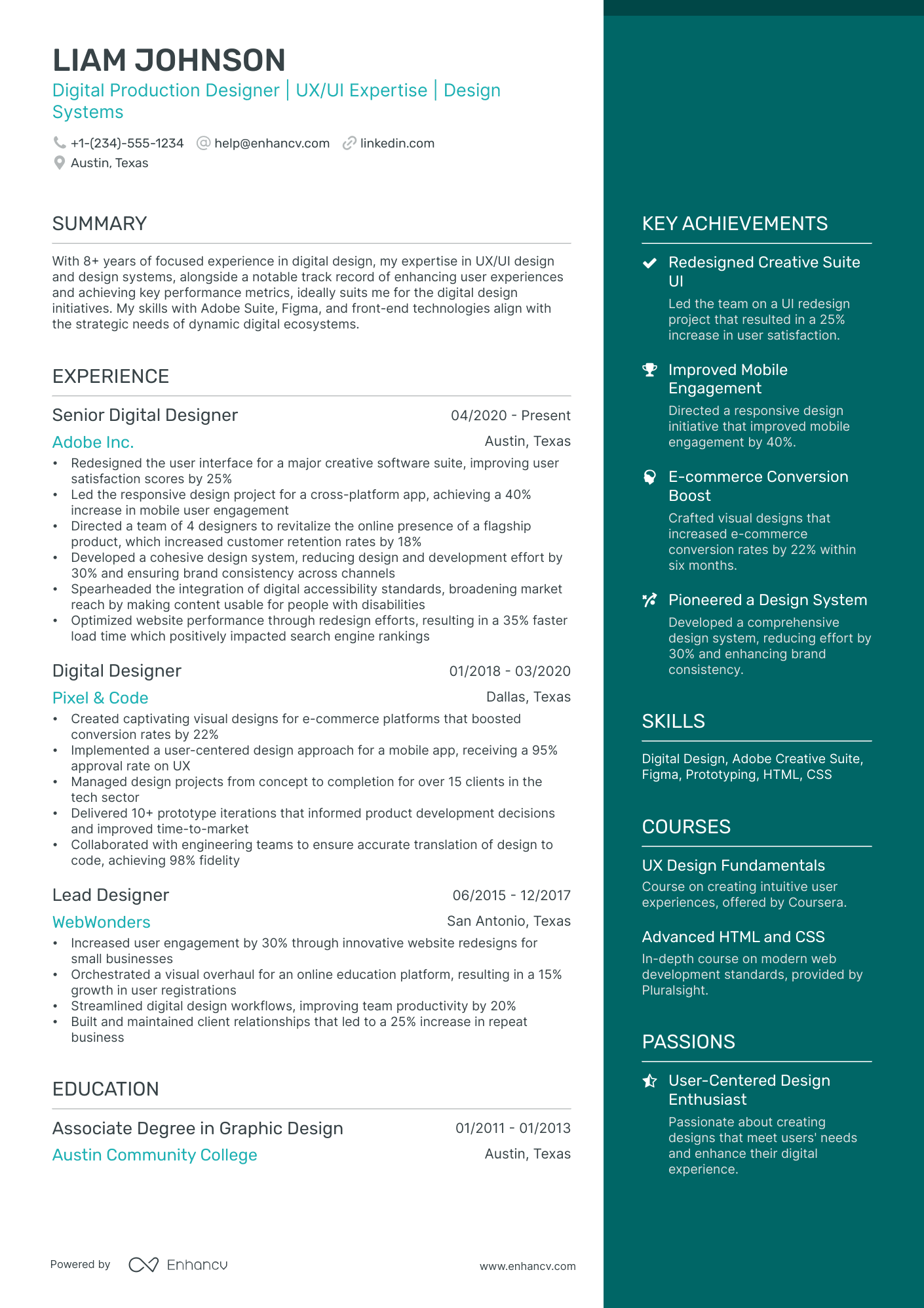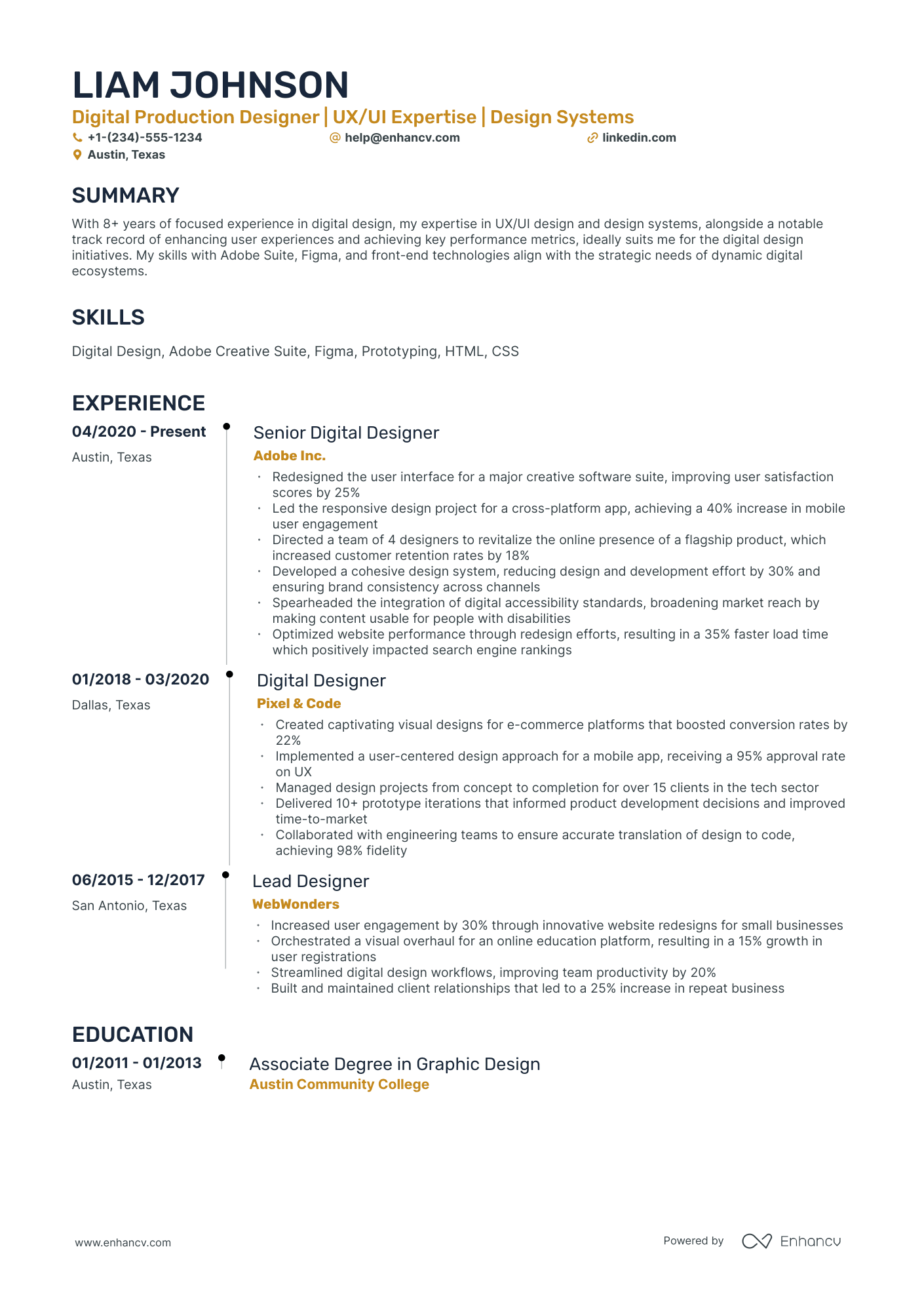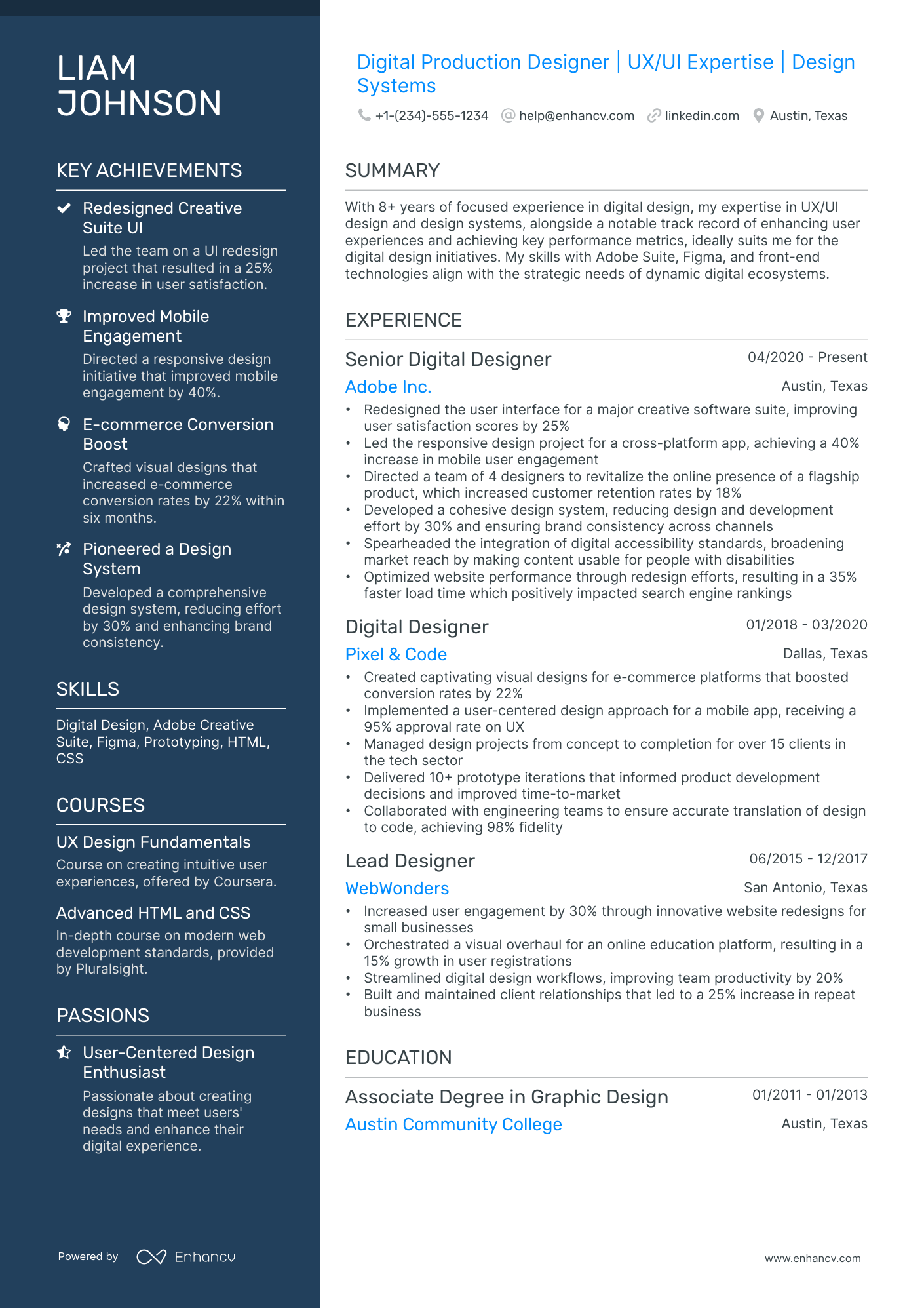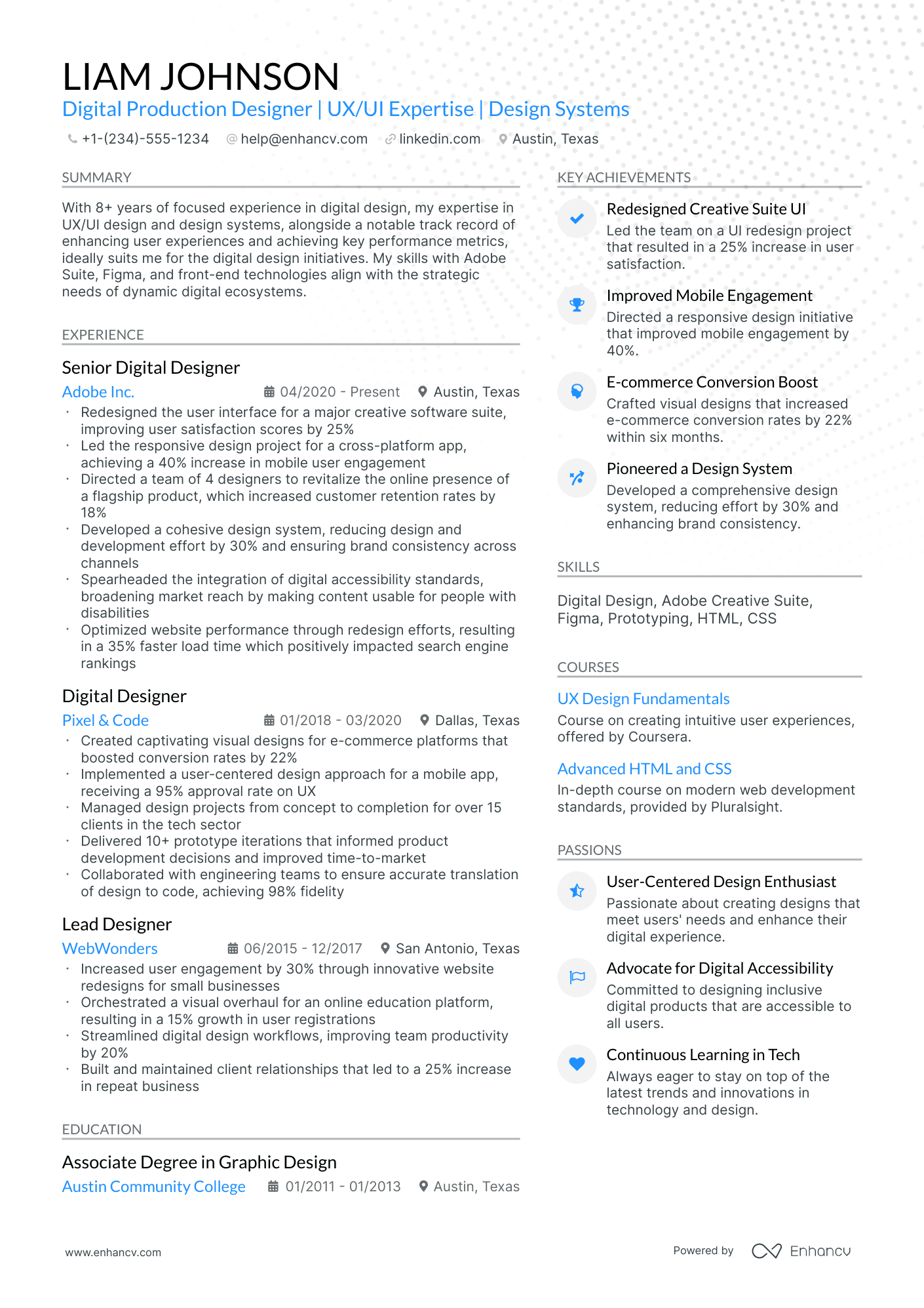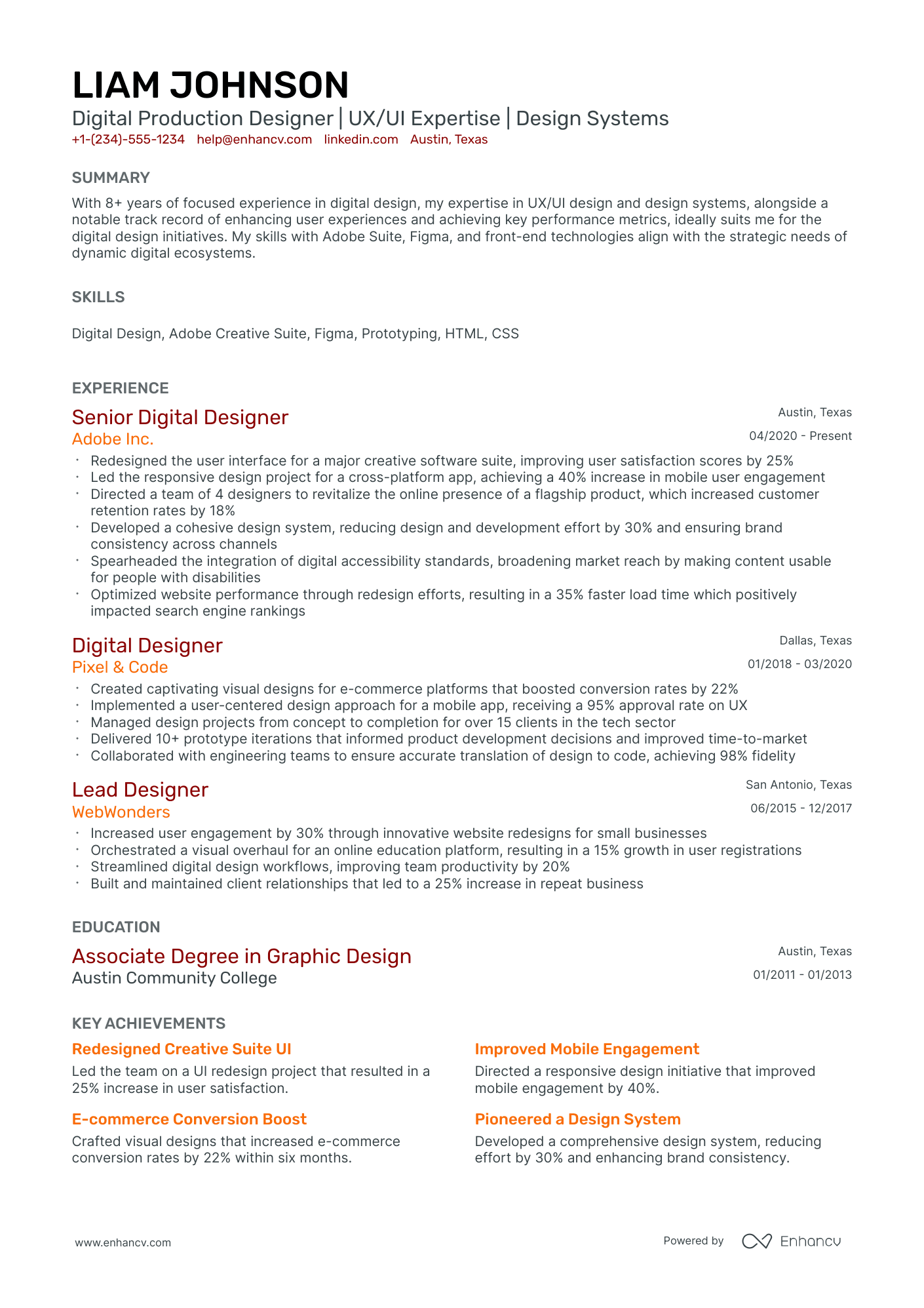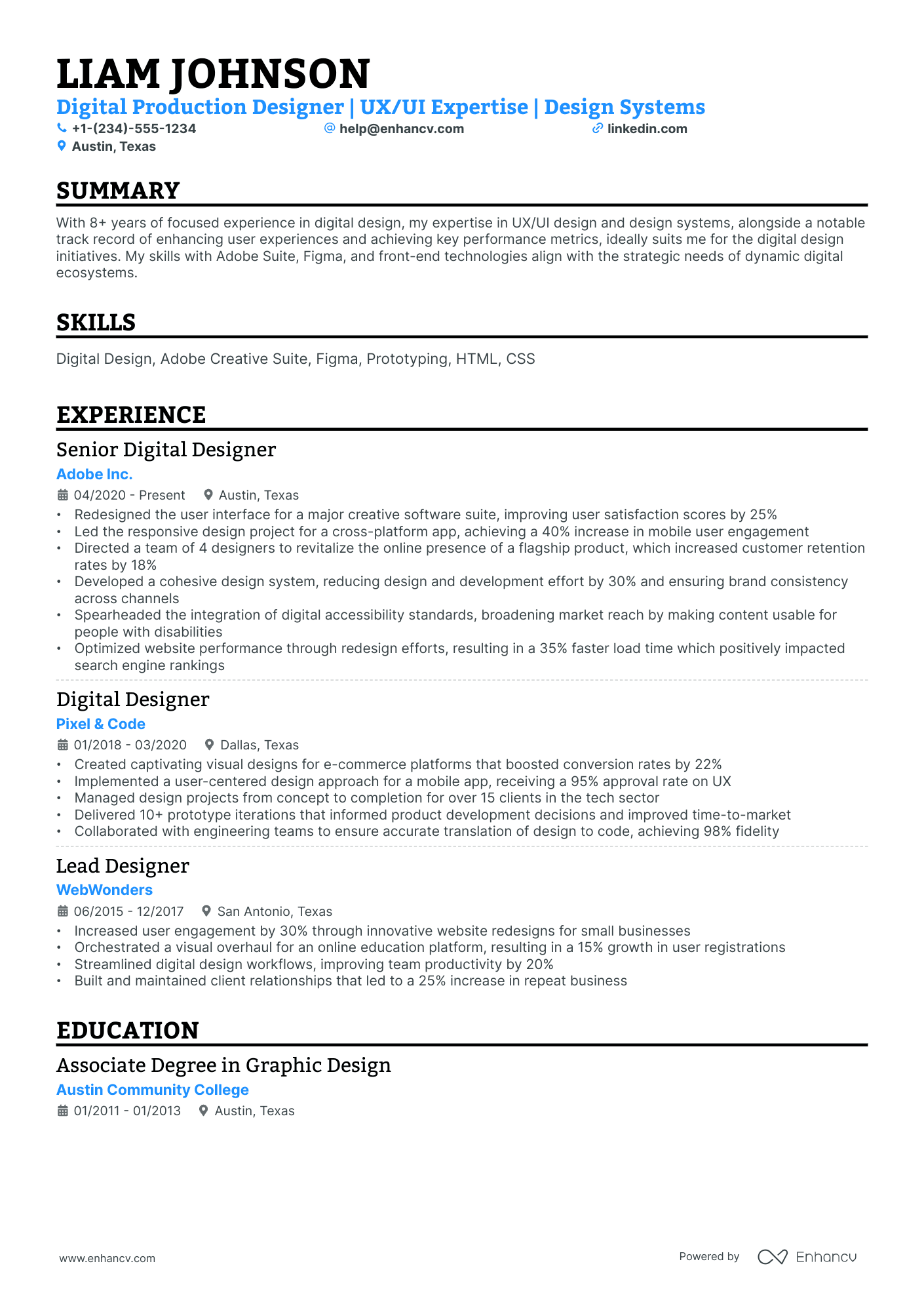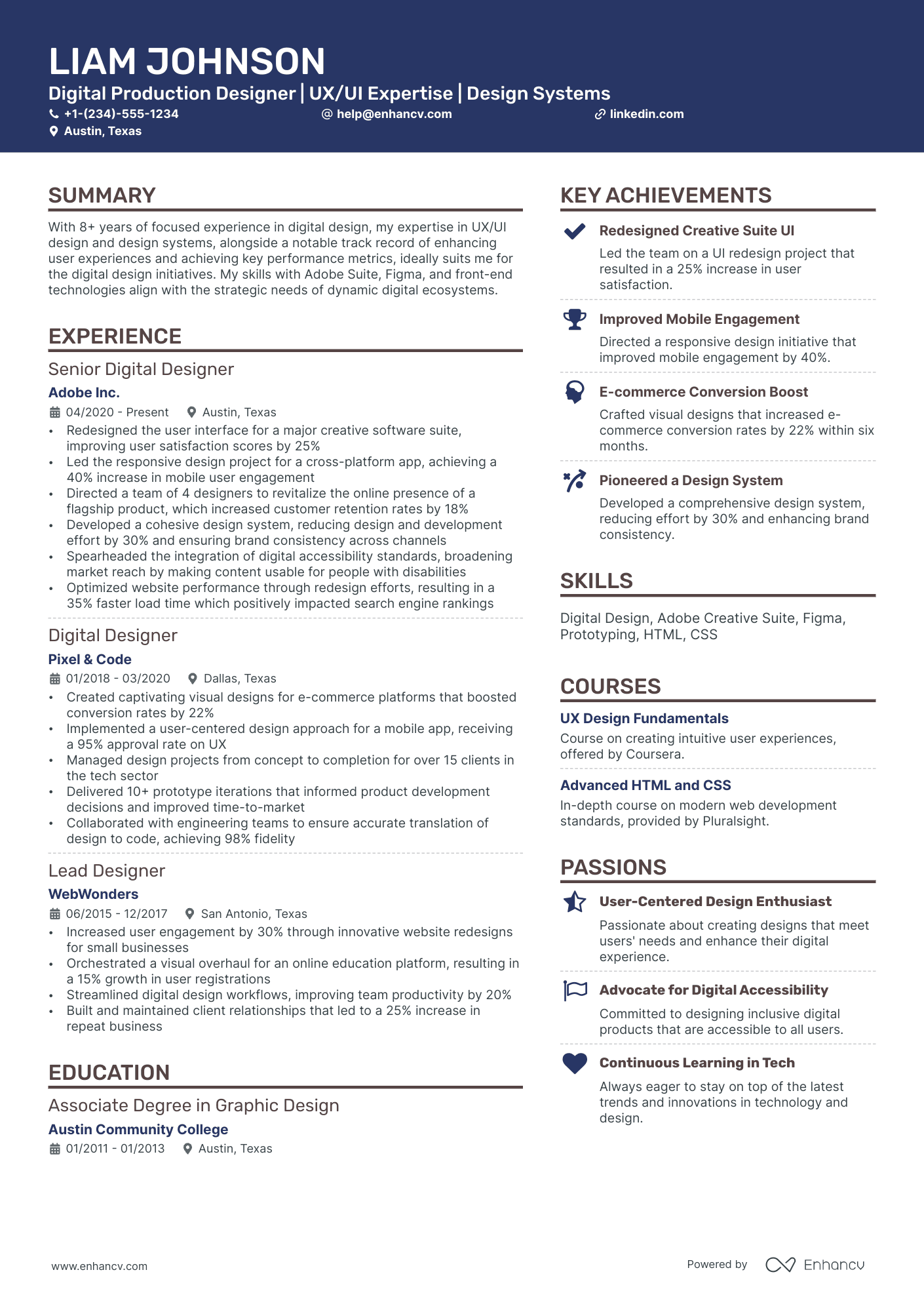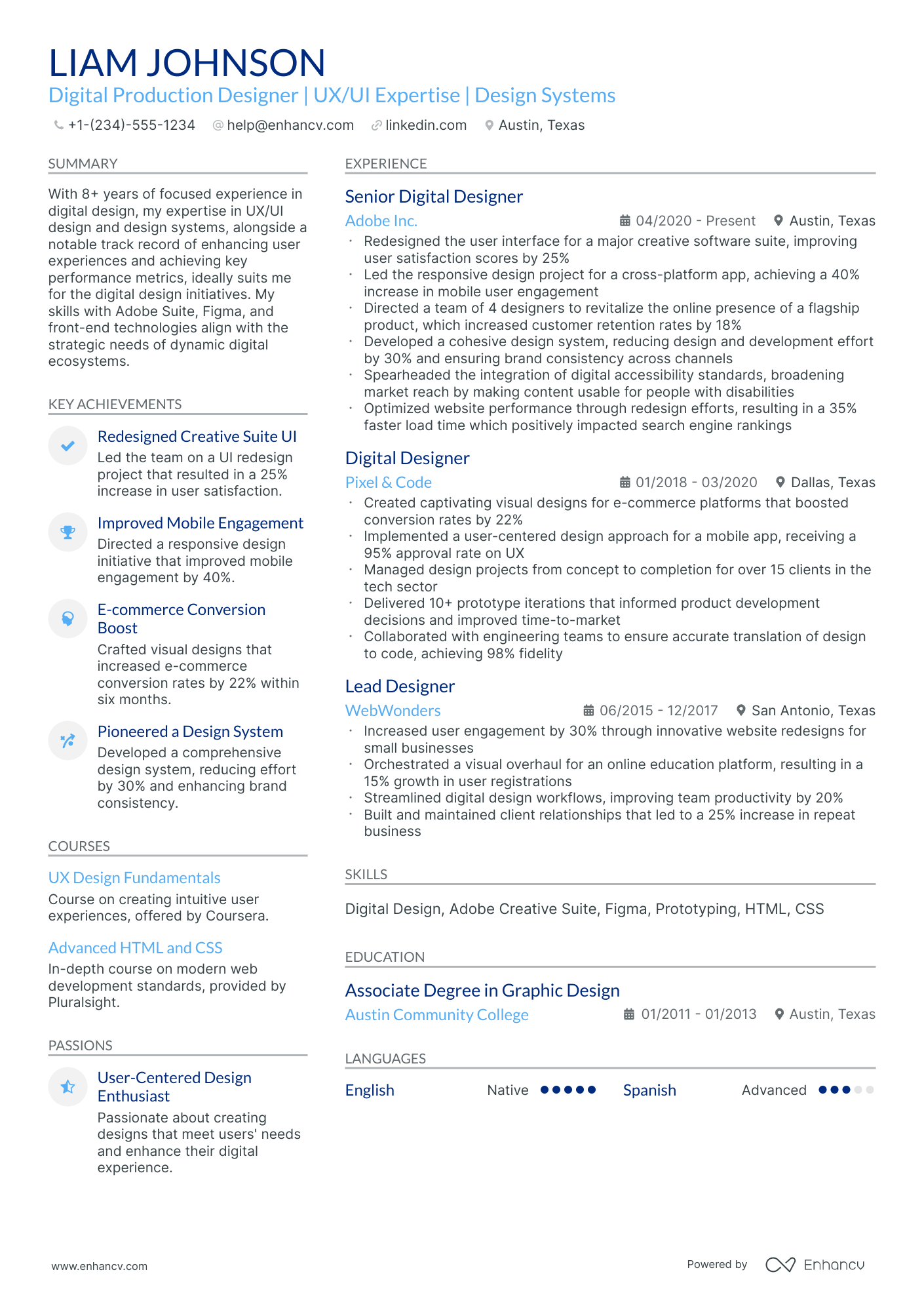As a production designer, you may find it challenging to succinctly showcase the range of your design skills and projects on your resume. Our guide offers tailored advice to help you effectively highlight your creative expertise and previous work, ensuring your resume stands out to potential employers.
- Production designer resume samples that got people hired at top companies.
- How to perfect the look-and-feel of your resume layout.
- How to showcase your achievements and skills through various resume sections.
- How you could hint to recruiters why your resume is the ideal profile for the job.
If the production designer resume isn't the right one for you, take a look at other related guides we have:
Best practices for the look and feel of your production designer resume
Before you even start writing your production designer resume, first you need to consider its layout and format.
What's important to keep in mind is:
- The reverse-chronological resume is the most widely used format to present your experience, starting with your latest job.
- Your production designer resume header needs to include your correct, professional contact details. If you happen to have a professional portfolio or an updated LinkedIn profile, include a link to it.
- Ensure your resume is no longer than two pages - you don't have to include irelevant experience on your resume just to make it look longer.
- Unless specified otherwise, submit your resume in the most popular format, the PDF one, as this will ensure your production designer resume isn't altered.
Different regions expect different formats – Canadian resumes, for example, may look unique.
Upload & Check Your Resume
Drop your resume here or choose a file. PDF & DOCX only. Max 2MB file size.
PRO TIP
Mention specific courses or projects that are pertinent to the job you're applying for.
The six in-demand sections for your production designer resume:
- Top one-third should be filled with a header, listing your contact details, and with a summary or objective, briefly highlighting your professional accolades
- Experience section, detailing how particular jobs have helped your professional growth
- Notable achievements that tie in your hard or soft skills with tangible outcomes
- Popular industry certificates to further highlight your technical knowledge or people capabilities
- Education to showcase your academic background in the field
What recruiters want to see on your resume:
- Portfolio of previous production designs to showcase creativity and range of skills in set design, construction, and adaptation for various types of productions.
- Experience with budget management and resource allocation, demonstrating the ability to deliver high-quality designs within financial constraints.
- Proficiency in industry-standard design software (such as AutoCAD, SketchUp, or 3ds Max) and knowledge of the latest technology in scenic design and construction.
- Understanding of different styles and historical periods in design, with the ability to adapt and create accurate and immersive environments for diverse projects.
- Strong leadership and collaboration skills, highlighting experiences in working with directors, producers, and other departments to realize a cohesive vision.
Defining your professional expertise in your production designer resume work experience section
The work experience section, often the most detailed part of your resume, is where you discuss your past roles and achievements. To effectively list your experience, consider these four key tips:
- Align your expertise with the job requirements. It's vital to integrate keywords matching the job criteria to pass initial assessments;
- Show, don’t just tell. Quantify your responsibilities by stating your actual achievements in previous roles;
- Include measurable metrics. For instance, how did your performance impact the annual ROI?
- Highlight crucial industry skills. Mention both technological knowledge and interpersonal skills in this section.
These guidelines will help you craft an impressive production designer resume work experience section that is bound to catch recruiters' attention.
- Led the transformation of conceptual narrative into visual design, managing a team of 15, driving production aesthetics for Marvel Studios' blockbuster film, increasing fan engagement and grossing over $1 billion globally.
- Orchestrated the design and construction of over 30 intricate film sets, ensuring environmental storytelling aligned with directorial vision within the constraints of a $150 million budget.
- Implemented innovative use of sustainable materials in set production, reducing carbon footprint by 25% without compromising visual impact for Universal Pictures.
- Overseen set design and collaborated with cinematographers to create compelling visual narratives for a series of TV commercials for Apple, leading to a 30% increase in audience engagement.
- Spearheaded the scenic design for HBO's critically acclaimed series 'Westworld,' enhancing storytelling through meticulous period-appropriate set creation.
- Cultivated partnerships with vendors to streamline procurement of design materials, cutting costs by 20% while maintaining high production values.
- Developed comprehensive storyboard integration strategies, translating script details into visual set elements, reflecting script intentions and supporting actors' performance.
- Managed budgeting for design department expenses of up to $5 million, optimizing resource allocation and expenditure for Netflix's original content productions.
- Facilitated cross-department communication to ensure seamless workflow between production design, costume, and special effects teams, enhancing overall production quality.
- Initiated and led the redesign of the main stage for the acclaimed Broadway show 'Hamilton,' contributing to its evocative and historic atmosphere, which resulted in increased ticket sales by 40%.
- Coordinated with lighting and sound teams to create a cohesive aesthetic for live performances, improving audience immersion and received standing ovations nightly.
- Designed, budgeted, and delivered set pieces under tight deadlines, illustrating adaptability and commitment to excellence in production quality for live events.
- Pioneered the incorporation of state-of-the-art 3D printing technology for set design, significantly reducing production time by 40% and fostering innovation at Lucasfilm.
- Supervised the visual design identity for the 'Star Wars' anthology series, ensuring brand consistency and fanbase appeal across global markets, directly influencing a 35% increase in merchandise sales.
- Managed multicultural design teams in remote locations, cultivating a collaborative international work environment and delivering projects on or ahead of schedule.
- Conducted in-depth research on 18th-century France for accurate scenography, establishing historically precise sets which captivated audiences for Amazon Studios' period drama series.
- Executed art direction for on-location shoots across various European locales, navigating logistical challenges and maintaining creative integrity under budgetary pressure.
- Facilitated the transition from traditional to digital design processes, enhancing team productivity and allowing more dynamic adjustments during filming.
- Coordinated with CGI and special effects departments to create immersive, fantastical landscapes for Warner Bros' 'Harry Potter' spin-off films, maximizing visual consistency and fan engagement.
- Managed an international team of designers and artists, creating a collaborative space that fostered creativity, meeting all milestones ahead of time.
- Crafted unique set design blueprints and prototypes, which received accolades for innovation and attention to detail, ensuring a lasting impact on the genre's aesthetic standards.
- Designed and executed groundbreaking virtual reality sets for interactive experiences at Sony Pictures, pushing the boundaries of audience interaction and increasing user retention by 50%.
- Led creative teams through the uncharted territory of VR set design, consistently delivering experiential spaces that engaged users both visually and physically.
- Secured and managed a multimillion-dollar budget for new media production design, ensuring all projects were delivered on time and under budget while achieving artistic excellence.
- Executed set design for animated features at Pixar Animation Studios, bringing complex story worlds to life, directly contributing to 'Coco's' success as the Best Animated Feature at the Oscars.
- Collaborated with animation directors to create environments that enhanced character progression and plot dynamics, increasing audience emotional engagement.
- Integrated feedback from test screenings to refine set designs, ensuring they supported the storytelling in an aesthetically pleasing and narratively conducive manner.
- Orchestrated the environment design for the post-apocalyptic world in 'Mad Max: Fury Road' feature film at Warner Bros., aiding in creating a robust and immersive universe that was praised by critics and audiences alike.
- Championed the integration of practical effects with digital enhancements to produce seamless landscapes, satisfying the director's artistic vision while respecting the franchise's aesthetic legacy.
- Negotiated with local and international suppliers to source authentic materials to construct the dystopian sets, effectively managing logistics despite challenging remote filming locations.
The following content includes information from "O*NET OnLine" by the U.S. Department of Labor, Employment and Training Administration (USDOL/ETA). Used under the CC BY 4.0 license. The data represents the top responsibilities present on the task lists for production designer professionals.
Top Responsibilities for Production Designer:
- Key information into computer equipment to create layouts for client or supervisor.
- Review final layouts and suggest improvements, as needed.
- Determine size and arrangement of illustrative material and copy, and select style and size of type.
- Develop graphics and layouts for product illustrations, company logos, and Web sites.
- Create designs, concepts, and sample layouts, based on knowledge of layout principles and esthetic design concepts.
- Use computer software to generate new images.
- Prepare digital files for printing.
- Confer with clients to discuss and determine layout design.
- Research the target audience of projects.
- Draw and print charts, graphs, illustrations, and other artwork, using computer.
Quantifying impact on your resume
- Include the overall budget managed for each production to demonstrate financial management skills.
- List the number of projects supervised annually to show experience and capability to handle workload.
- Specify the square footage of sets designed to give a sense of scale and space planning abilities.
- Mention the number of team members led, to highlight leadership and teamwork competencies.
- Detail the percentage of projects completed on or under budget, showcasing cost-efficiency and financial acumen.
- Quantify the number of awards or nominations received, evidencing recognition in the industry.
- State the variety of genres and styles worked in, with numbers, to demonstrate versatility.
- Present the increase in efficiency or reduction in construction time due to innovations implemented, showing problem-solving and improvement contributions.
Action verbs for your production designer resume
Remember these four tips when writing your production designer resume with no experience
You've done the work - auditing the job requirements for keywords and have a pretty good idea of the skill set the ideal candidate must possess.
Yet, your professional experience amounts to a summer internship .
Even if you have limited or no professional expertise that matches the role you're applying for, you can use the resume experience section to:
- List extracurricular activities that are relevant to the job requirements. Let's say you were editor-in-chief of your college newspaper or part of the engineering society. Both activities have taught you invaluable, transferrable skills (e.g. communication or leadership) that can be crucial for the job;
- Substitute jobs with volunteer experience. Participating in charity projects has probably helped you develop an array of soft skills (e.g. meeting deadlines and interpersonal communications). On the other hand, volunteering shows potential employers more about you: who you are and what are the causes you care about;
- Align job applications with your projects. Even your final-year thesis work could be seen as relevant experience, if it's in the same industry as the job you're applying for. Ensure you've listed the key skills your project has taught you, alongside tangible outcomes or your project success;
- Shift the focus to your transferrable skills. We've said it before, but recruiters will assess your profile upon both job requirements and the skills you possess. Consider what your current experience - both academic and life - has taught you and how you've been able to develop your talents.
Recommended reads:
PRO TIP
Showcase any ongoing or recent educational efforts to stay updated in your field.
Bringing your production designer hard skills and soft skills to the forefront of recruiters' attention
Hard skills are used to define the technological (and software) capacities you have in the industry. Technical skills are easily defined via your certification and expertise.
Soft skills have more to do with your at-work personality and how you prosper within new environments. People skills can be obtained thanks to your whole life experience and are thus a bit more difficult to define.
Why do recruiters care about both types of skills?
Hard skills have more to do with job alignment and the time your new potential employers would have to invest in training you.
Soft skills hint at how well you'd adapt to your new environment, company culture, and task organization.
Fine-tune your resume to reflect on your skills capacities and talents:
- Avoid listing basic requirements (e.g. "Excel"), instead substitute with the specifics of the technology (e.g. "Excel Macros").
- Feature your workplace values and ethics as soft skills to hint at what matters most to you in a new environment.
- Build a separate skills section for your language capabilities, only if it makes sense to the role you're applying for.
- The best way to balance production designer hard and soft skills is by building a strengths or achievements section, where you define your outcomes via both types of skills.
There are plenty of skills that could make the cut on your resume.
That's why we've compiled for you some of the most wanted skills by recruiters, so make sure to include the technologies and soft skills that make the most sense to you (and the company you're applying for):
Top skills for your production designer resume:
Adobe Creative Suite
SketchUp
AutoCAD
Maya
3ds Max
Cinema 4D
ZBrush
CorelDRAW
Unity
Artlantis
Creativity
Communication
Collaboration
Problem-solving
Time management
Attention to detail
Adaptability
Critical thinking
Decision making
Project management
Next, you will find information on the top technologies for production designer professonals from "O*NET OnLine" by the U.S. Department of Labor, Employment and Training Administration (USDOL/ETA). Used under the CC BY 4.0 license.
Top technologies for Production Designer’s resume:
- AJAX
- Oracle JavaServer Pages JSP
- Adobe After Effects
- YouTube
- Autodesk AutoCAD Civil 3D
- Autodesk Revit
PRO TIP
If you failed to obtain one of the certificates, as listed in the requirements, but decide to include it on your resume, make sure to include a note somewhere that you have the "relevant training, but are planning to re-take the exams". Support this statement with the actual date you're planning to be re-examined. Always be honest on your resume.
Your academic background: should you include your education and certifications on your production designer resume?
Adding relevant education and certifications to your production designer resume is beneficial, whether you're an experienced candidate or just starting in the field.
Featuring your higher education degree that aligns with the role demonstrates your commitment to the industry. On your production designer resume, include the start and graduation dates, followed by the name of the institution that awarded your degree.
Regarding certifications, it's wise to list those most relevant to the role or that have contributed to your array of crucial technical or personal traits. Be sure to include the name of the certificate and the awarding institution.
If uncertain about which certifications to feature prominently on your production designer resume, refer to our compiled list of the most in-demand ones for guidance.
The top 5 certifications for your production designer resume:
- AutoCAD Certified Professional (ACP) - Autodesk
- Adobe Certified Expert (ACE) - Adobe
- Certified SolidWorks Professional (CSWP) - Dassault Systèmes
- National Council for Interior Design Qualification (NCIDQ) Certification - Council for Interior Design Qualification
- Project Management Professional (PMP) - Project Management Institute
The content below includes information from "O*NET OnLine" by the U.S. Department of Labor, Employment and Training Administration (USDOL/ETA). Used under the CC BY 4.0 license. The data represents the top associations for production designer professionals.
Top US associations for a Production Designer professional
- Council for Advancement and Support of Education
- Graphic Artists Guild
- National Association of Schools of Art and Design
- Professional Association for Design
- SEGD
PRO TIP
If the certificate you've obtained is especially vital for the industry or company, include it as part of your name within the resume headline.
Recommended reads:
The ideal production designer candidate resume summary or objective
You may have heard that your resume top one-third plays an important part in your application.
It basically needs to show strong alignment with the job advert, your unique skill set, and your expertise.
Both the resume summary and resume objective could be used to ensure you've shown why you're the best candidate for the role.
Use the:
- Resume objective to pinpoint your current successes, that are applicable to the field, and your vision for your career. Remember to state how you see yourself growing within this new career opportunity.
- Resume summary as an instrument to pinpoint what is most applicable and noteworthy form your professional profile. Keep your summary to be no more than five sentences long.
At the end of the day, the resume summary or objective is your golden opportunity to shine a light on your personality as a professional and the unique value of what it's like to work with you.
Get inspired with these production designer resume examples:
Resume summaries for a production designer job
- Seasoned production designer with over 8 years of experience creating visually compelling sets for high-grossing films and reputable television series. Skilled in AutoCAD, SketchUp, and Adobe Creative Suite with a proven track record of designing innovative environments that contribute significantly to the storytelling process. Awarded Best Production Design at the prestigious Filmakers Festival in 2020.
- Resourceful Architect transitioning into Production Design with a strong background in space planning and project management. Possesses 15 years of experience in conceptualizing and executing designs for large-scale construction projects, bringing a unique perspective to cinematographic set design. Proficient in 3D rendering and CAD software with a solid understanding of sustainable design practices.
- Dynamic Graphic Designer eager to apply a decade of experience in visual communication and branding to the field of Production Design. Bringing a fresh approach to set creation, adept in Adobe Suite, with a robust portfolio showcasing diverse designs across various platforms. Keen to merge technical design skills with storytelling to enhance film and television productions.
- Former Event Planner with a keen eye for detail now pursuing a career in Production Design. Leveraging a 7-year tenure orchestrating large-scale corporate events, adept at coordinating with cross-functional teams and meeting tight deadlines. Adept at budget management and vendor negotiation, ready to translate event design experience into dynamic film and TV sets.
- Aspiring production designer with a Bachelor’s degree in Fine Arts and a passion for creating immersive experiences. Eager to leverage academic training and a strong personal interest in cinematography to contribute to the visual storytelling of upcoming projects. Highly motivated to learn from industry professionals and bring energy and creativity to collaborative set design efforts.
- Recent graduate with a keen interest in cinema and stage production seeking an entry-level role in Production Design. Armed with an MFA in Theatre Design and Technology and internships at local theaters, eager to apply theoretical knowledge and hands-on experience. Enthusiastic about developing practical skills in set construction, scenic painting, and prop creation under expert guidance.
Optimize your resume summary and objective for ATS
Drop your resume here or choose a file.
PDF & DOCX only. Max 2MB file size.
Average salary info by state in the US for production designer professionals
Local salary info for Production Designer.” Source: My Next Move, National Center for O*NET Development. Accessed 10/15/2024
| State | Average Salary (in USD) |
|---|---|
| US National Average | $58,910 |
| California (CA) | $74,360 |
| Texas (TX) | $53,100 |
| Florida (FL) | $53,970 |
| New York (NY) | $74,410 |
| Pennsylvania (PA) | $52,000 |
| Illinois (IL) | $57,090 |
| Ohio (OH) | $50,470 |
| Georgia (GA) | $56,460 |
| North Carolina (NC) | $53,710 |
| Michigan (MI) | $51,110 |
Miscellaneous production designer resume sections for a more personalized approach
Your production designer resume can reflect even more upon your personality and best qualities - that is if you decide on including a couple of additional resume sections to support your application.
Some of the best-accepted industry-wide choices include the:
- Resume projects - getting into the outcomes of your most important work, so far;
- Languages on your resume - detailing your proficiency level;
- Special recognitions - dedicated to your most prominent industry awards;
- Hobbies and interests - defining how you spend your free time.
Key takeaways
- The format and layout of your production designer resume should reflect on both your career and what matters most to the job you're applying for;
- Use the resume summary and objective to hint at your most prominent accomplishments;
- Always be specific about your experience and consider what value each bullet you curate adds to your production designer application;
- Consider how your academic background and technical capabilities could further showcase your alignment to the role;
- Your soft skills should contribute to your overall production designer profile - aligning your personality with skills and results.
